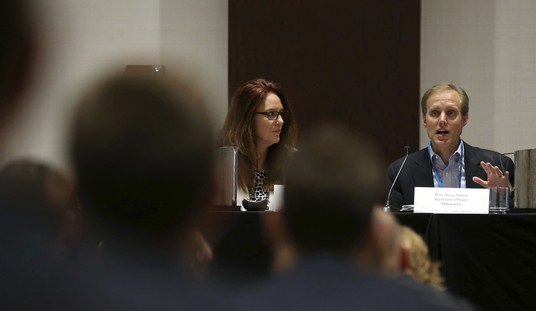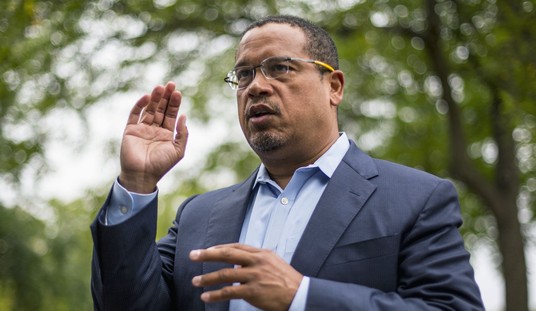The killing of al-Qaeda leader Anwar al-Awlaki generated a surprising amount of controversy. The US had used drones to kill scores of AQ leaders and followers in Pakistan, Afghanistan, and Yemen before Awlaki and afterward. However, Awlaki was a US citizen, and the targeting of an American citizen by the government was considered a new step — and not necessarily a good one. The demand for a controlling procedure began to grow, amplified ironically by Barack Obama himself when the New York Times reported that he tried to rush rules into place for drone use in case Mitt Romney won the election, only to lose interest when it became clear he would win.
Unfortunately, that didn’t stop people from demanding to know how exactly the Obama administration protected the rights of Americans and ensured that a drone strike on a US citizen was undeniably justified. A leak from the Department of Justice makes it clear that it’s not clear at all:
The secrecy surrounding such strikes is fast emerging as a central issue in this week’s hearing of White House counterterrorism adviser John Brennan, a key architect of the drone campaign, to be CIA director. Brennan was the first administration official to publicly acknowledge drone strikes in a speech last year, calling them “consistent with the inherent right of self-defense.” In a separate talk at the Northwestern University Law School in March, Attorney General Eric Holder specifically endorsed the constitutionality of targeted killings of Americans, saying they could be justified if government officials determine the target poses “an imminent threat of violent attack.”
But the confidential Justice Department “white paper” introduces a more expansive definition of self-defense or imminent attack than described by Brennan or Holder in their public speeches. It refers, for example, to what it calls a “broader concept of imminence” than actual intelligence about any ongoing plot against the U.S. homeland.
“The condition that an operational leader present an ‘imminent’ threat of violent attack against the United States does not require the United States to have clear evidence that a specific attack on U.S. persons and interests will take place in the immediate future,” the memo states.
Instead, it says, an “informed, high-level” official of the U.S. government may determine that the targeted American has been “recently” involved in “activities” posing a threat of a violent attack and “there is no evidence suggesting that he has renounced or abandoned such activities.” The memo does not define “recently” or “activities.”
As in Holder’s speech, the confidential memo lays out a three-part test that would make targeted killings of American lawful: In addition to the suspect being an imminent threat, capture of the target must be “infeasible, and the strike must be conducted according to “law of war principles.” But the memo elaborates on some of these factors in ways that go beyond what the attorney general said publicly. For example, it states that U.S. officials may consider whether an attempted capture of a suspect would pose an “undue risk” to U.S. personnel involved in such an operation. If so, U.S. officials could determine that the capture operation of the targeted American would not be feasible, making it lawful for the U.S. government to order a killing instead, the memo concludes.
The undated memo is entitled “Lawfulness of a Lethal Operation Directed Against a U.S. Citizen who is a Senior Operational Leader of Al Qa’ida or An Associated Force.” It was provided to members of the Senate Intelligence and Judiciary committees in June by administration officials on the condition that it be kept confidential and not discussed publicly.
So let’s just recap. The US can target a US citizen if they believe a threat to be “imminent” even when no threat of attack is immediately present. The target must have recently been involved in activities, with no real definition of “activities” or “recently.” And rather than prove that the US citizen plans to continue these “activities,” it’s up to the citizen to prove to a single US official that no one knows that he’s renounced and/or abandoned such “activities” — activities that the government won’t define, to an official the government won’t name.
Awlaki was an easy case. He publicly and explicitly encouraged terrorist acts, recruited new members to carry them out, and was connected to plots that actually went into action. But this memo goes way beyond the Awlaki instance and basically gives the government carte blanche to target Americans in whatever it considers to be the battlefield for almost any kind of “threat” it imagines.
Surely we can do better than this to find a hard line between the case of Awlaki and no line at all. And surely Congress can press John Brennan about this point during his confirmation hearing to the post of CIA Director.
Update: It looks like the Senate may be getting serious about this issue, too:
Eleven senators sent a letter to President Obama on Monday demanding access to secret legal memos outlining the administration’s case for the targeted killing of U.S. citizens in counterterrorism operations overseas.
The letter from eight Democrats and three Republicans contained the most forceful warning to date that lawmakers were considering blocking Obama’s nominees to run the CIA and Pentagon unless the memos are turned over.
The message comes three days before White House counterterrorism adviser John O. Brennan will face a confirmation hearing to become CIA director before the Senate intelligence committee. Former senator Chuck Hagel (R-Neb.) is awaiting a vote in the Senate Armed Services Committee following his hearing last week to become secretary of defense.
Cooperation with the request “will help avoid an unnecessary confrontation that could affect the Senate’s consideration of nominees for national security positions,”the letter said.
Three members of the intelligence panel signed the letter: Sens. Ron Wyden (D-Ore.), Mark Udall (D-Colo.) and Susan Collins (R-Maine).








Join the conversation as a VIP Member